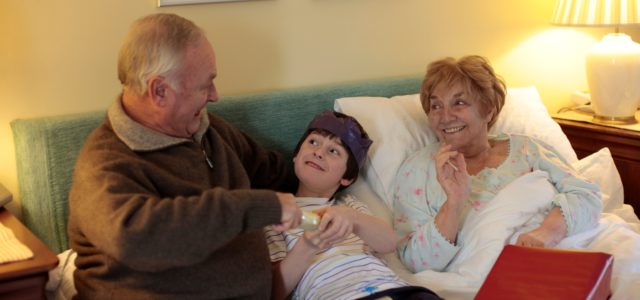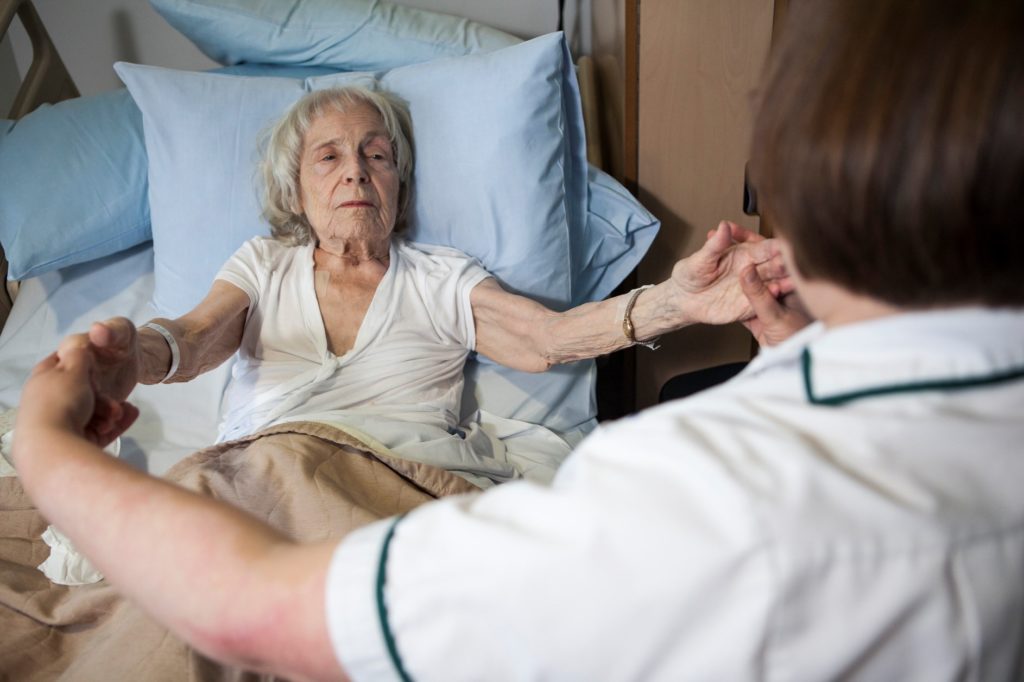Richard Meade
When somebody becomes terminally ill and begins to approach the end of their life, they are likely to need various forms of care and help. They may also have aspirations and hopes for the time they have left. It can be a traumatic, challenging and complex time, but equally some people say they experience moments of great joy, often by being able to make the most of the time they have left.
To enable someone to live as well as possible for as long as possible they will need help with the relief of their physical symptoms and pain, but also support with emotional and spiritual needs. This will help them plan and give them the best chance of realising their wishes. To enable this to happen a number of people might have to be involved, including health and social care professionals, family members, and friends. We call this a palliative care approach.
Palliative care can support a person with any terminal illness and should begin from the point when they need it. For some that will be years from their death, but for others only weeks, days or even hours. We only have one chance to get this right, and either way it will make a lasting impression on all those who are left behind.
Missing out
The sad truth is that not everyone gets this approach. A report published by the London School of Economics (LSE) in 2014 suggested about a quarter (120,000) of people who die each year of a terminal illness across the UK miss out on appropriate palliative care. This is a huge gap.
People who miss out are far more likely to experience episodes of pain and uncontrolled symptoms. They are also at greater risk of being admitted to hospital and then not being able to get home. According to the Office for National Statistics, nearly half of people across the UK die in hospital, but the evidence suggests that the vast majority of them would prefer to die at home or in a community setting.
Why do people miss out?
Those who are likely to miss out are from poorer communities, different ethnic backgrounds, are lesbian, gay or transgender, or live in a rural community (LSE Report). The older you are the less likely you are to get the care you need if you are terminally ill, yet those over 85 make up the greatest number of deaths each year (Lloyd et al 2016).
Disease type is another key factor. Those with advanced cancer are far more likely to get the care and support they need when compared with people dying of heart failure, dementia or motor neurone disease. Increasingly many people will be living with multiple conditions and frailty. This can make their care needs complex and it may not always be easy to identify the exact point when a person starts to need a palliative care approach. Palliative care is proven to support any terminal condition and frailty.
We know that not all healthcare professionals, either in the community or in specialist settings, are identifying their patients for palliative care, even when they need it. Even those that are identified often only receive palliative care a matter of weeks before the end of life, and certainly not from the point of need (Tapsfield J, Hall C, Lunan C, et al 2016). When introduced at the later stage it is likely to focus more on symptom control and pain relief, and less on emotional and social needs. This can leave final wishes unfulfilled.
From hospital to home
Specialists and community based palliative care services do not work in isolation. A palliative approach can only be effective when hospital teams, GPs, district nurses, social care teams, third sector providers and community groups work together. Yet, often people face fragmented service provision, placing considerable burdens on the informal carer who gives most of their time to care for the ill person.
Over a quarter of a million people die in hospital every year in the UK. An extensive research study has shown that three in ten people in hospital on a given day are in their last 12 months of life. This increases to nearly half for those over 85 (Clark et al 2014). One in ten will die on their current admission. Hospitals can clearly play a critical role in supporting a palliative approach, but it is far from clear that they always do. This research poses important questions about whether or not we are identifying these people and ensuring they get discharged with the right support. For those that may die in hospital, there is no guarantee that appropriate care will be provided.
For those who wish to be cared for at home, they will require social care support. Far too often however, it is not enough, with people left relying on the support of very short visits or none at all. There is limited training for care at home services in supporting someone with a terminal illness and at end of life. Without adequate support at home, a person is at considerable risk of being admitted or readmitted to hospital.
Changing population demographics suggest that if current trends continue, by 2040 care homes will replace hospitals as the place where most people will die (Bone AE, Gomes B, Etkind SN, Verne J, Murtagh FE, Evans CJ et al 2017). For this to happen we will need a greater level of investment in care homes, especially for their staff. The workforce, although often passionate and caring, struggles with an incredibly high turnover, and is commonly low paid and poorly trained. This makes it difficult for care homes to support people with palliative care needs now and going forward.
If we are to truly meet the needs of all those with a terminal illness and at end of life who wish to be cared for in their community, we need to invest in the social care workforce, particularly training and support in palliative care. This will especially be the case for those who cannot rely on the support of someone, usually a family member, to care for them at home. Those living alone who wish to stay there will be very dependent on the capabilities of the statutory services.
The political response
There can be no doubt that across the UK, palliative care has enjoyed a considerable amount of attention over the last few years and has become an increasingly higher priority for all the national Governments and Executives.
Since the LSE report, new palliative care strategies have emerged in England, Scotland, Wales and Northern Ireland. All these plans are working towards universal access to palliative care.
Having a strategy on its own is not enough. We need much more than this if we are to see a decrease in the number of people missing out on palliative care.
There has been no real extra financial resource made available to support investment in community and specialist palliative care services that would help meet the ambition of these strategies. Commissioners and providers, as with so many services, have been asked to do more with the same resources, or even less.
Building a case to invest in palliative care?
The health economic research in this area tells us that a palliative care approach works. The LSE study highlighted savings of over £40million that could be made across the UK by extending ‘specialist and core’ palliative care services to those that would benefit but are currently missing out. An evaluation of the Marie Curie nursing service in England identified healthcare savings of around £500 per person in the care of the service when compared to those without. A number of studies show that avoiding hospital deaths saves money, yet still nearly half of people die in hospital.
However, there is not enough research being carried out into the economic case for investing in palliative care services. A greater evidence base combined with greater evaluations of services would help make a more compelling case for investment for commissioners.
Research in all aspects of palliative care is lacking. This is especially true when compared with studies into the prevention and cure of life-threatening illness. Data from the National Cancer Research Institute shows that less than 0.3% of the £500 million spent on cancer research is allocated to palliative care, with funding for non-cancer conditions likely to be even less (Higginson 2016).
The need for research to inform policy and practice is crucial. A strong evidence base can not only inform policy and improve care and support, but it can also help show progress against policy ambition. The research used previously to show the level of unmet need is not routinely collected, making it hard to track or demonstrate trends over time. It also means that there is nothing to show whether or not the gap is decreasing. There is a distinct lack of data which makes it very difficult to measure progress in numbers.
Getting it right before it is too late
Over the next 25 years, the number of deaths in the UK will increase by around 100,000 a year, so if we do nothing more than stay still in terms of level of support offered to people with a terminal illness then the problem will grow and more people will die without adequate care.
There is an increased awareness across the UK regarding the importance of palliative care and recognition that it can support more than those with terminal cancer. Despite this, no government has moved with any real urgency to address the current levels of unmet need. There have been no large injections of resource into community based or specialist palliative care services. If we are to ensure that everyone gets a palliative approach when they are terminally ill then this investment needs to take place now. If not, then the next decade will see more than a million people in the UK die without the care they need – which will be a national tragedy.
References:
Bone AE, Gomes B, Etkind SN, Verne J, Murtagh FE, Evans CJ et al. (2017) What is the impact of population ageing on the future provision of end-of-life care?: Population-based projections of place of death. Palliative Medicine. Published Online First Oct 10.
Clark D et al. (2014) Imminence of death among a national cohort of hospital inpatients. Palliative Medicine, 28(6).
Higginson IJ. (2016). Research challenges in palliative and end of life care. BMJ Supportive & Palliative Care. 6(1).
Lloyd A et al. (2016) Why do older people get less palliative care than younger people? European Journal of Palliative Care, 23(3).
Tapsfield J, Hall C, Lunan C, et al (2016) Many people in Scotland now benefit from anticipatory care before they die: an after death analysis and interviews with general practitioners. BMJ Supportive & Palliative Care Published Online First: 13 April.
Richard Meade is Head of Policy and Public Affairs, Scotland, Marie Curie. He is responsible for leading the Marie Curie’s policy and public affairs work in Scotland. This includes representing the work of the charity to the Scottish Parliament and Government as well as campaigning to ensure that people living with a terminal illness and their families get the best possible care and the support they need wherever they are. He has previously worked for Barnardo’s Scotland, Children 1st, Fleishman-Hillard, Help the Aged, the NHS and the Home Office. He has a BA (Hons) in History and Politics from Stirling University and an MSc in Policy Studies from Edinburgh University.


